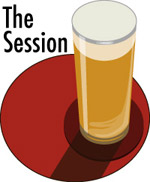Research commissioned by UK brewer Greene King found “35 is the age at which British men typically settle on their ‘usual.’ ”
So I guess I’m a little slow. I don’t even have a “usual” style.
On the other hand perhaps I’m precocious, because “they trial an average of seven different brands before developing a loyalty to their favourite beer.” Only seven beers? Check out Luke Nicholas’ Twitter feed from last night. (And he’s from New Zealand.)
Obviously some across-the-pond cultural differences here. Nonetheless, more from the survey:
– One in five men try up to 14 different kinds of beer before settling on their favorite, and that is determined “on quality and taste above all other factors – including price, brand, strength and peer pressure from friends.”
– Peer pressure? Twenty-nine percent of those 18 to 24 order the same beer as their friends. Just 7% of men over the age of 35 are similarly influenced.
– While men in London are the most likely to rate quality as the key factor in their beer preferences, Londoners are also most influenced in their choice of beer by their mates (16%), and men in Yorkshire the least (4%).
 Hosts Boak & Bailey have announced the theme for the next Session:
Hosts Boak & Bailey have announced the theme for the next Session: